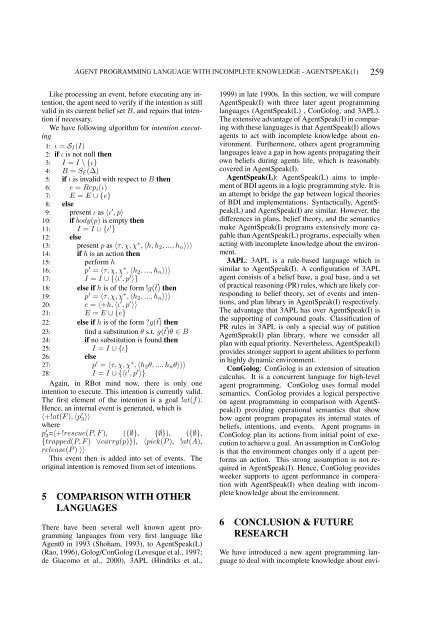Back Room Front Room 2
Back Room Front Room 2
Back Room Front Room 2
Create successful ePaper yourself
Turn your PDF publications into a flip-book with our unique Google optimized e-Paper software.
AGENT PROGRAMMING LANGUAGE WITH INCOMPLETE KNOWLEDGE - AGENTSPEAK(1)<br />
Like processing an event, before executing any intention,<br />
the agent need to verify if the intention is still<br />
valid in its current belief set B, and repairs that intention<br />
if necessary.<br />
We have following algorithm for intention executing<br />
1: ι = SI(I)<br />
2: if ι is not null then<br />
3: I = I \{ι}<br />
4: B = SE(∆)<br />
5: if ι is invalid with respect to B then<br />
6: e = Repi(ι)<br />
7: E = E ∪{e}<br />
8: else<br />
9: present ι as 〈ι ′ ,p〉<br />
10: if body(p) is empty then<br />
11: I = I ∪{ι ′ }<br />
12: else<br />
13: present p as 〈τ, χ, χ ∗ , 〈h, h2, ..., hn〉〉〉<br />
14: if h is an action then<br />
15: perform h<br />
16: p ′ = 〈τ, χ, χ ∗ , 〈h2, ..., hn〉〉〉<br />
17: I = I ∪{〈ι ′ ,p ′ 〉}<br />
18: else if h is of the form !g(�t) then<br />
19: p ′ = 〈τ, χ, χ ∗ , 〈h2, ..., hn〉〉〉<br />
20: e = 〈+h, 〈ι ′ ,p ′ 〉〉<br />
21: E = E ∪{e}<br />
22: else if h is of the form ?g(�t) then<br />
23: find a substitution θ s.t. g(�t)θ ∈ B<br />
24: if no substitution is found then<br />
25: I = I ∪{ι}<br />
26: else<br />
27: p ′ = 〈τ, χ, χ ∗ , 〈h2θ, ..., hnθ〉〉〉<br />
28: I = I ∪{〈ι ′ ,p ′ 〉}<br />
Again, in RBot mind now, there is only one<br />
intention to execute. This intention is currently valid.<br />
The first element of the intention is a goal !at(f).<br />
Hence, an internal event is generated, which is<br />
〈+!at(F ), 〈p ′ 3〉〉<br />
where<br />
p ′ 3=〈+!rescue(P, F), ({∅}, {∅}), ({∅},<br />
{trapped(P, F) ∨carry(p)}), 〈pick(P ), !at(A),<br />
release(P ) 〉〉<br />
This event then is added into set of events. The<br />
original intention is removed from set of intentions.<br />
5 COMPARISON WITH OTHER<br />
LANGUAGES<br />
There have been several well known agent programming<br />
languages from very first language like<br />
Agent0 in 1993 (Shoham, 1993), to AgentSpeak(L)<br />
(Rao, 1996), Golog/ConGolog (Levesque et al., 1997;<br />
de Giacomo et al., 2000), 3APL (Hindriks et al.,<br />
1999) in late 1990s. In this section, we will compare<br />
AgentSpeak(I) with three later agent programming<br />
languages (AgentSpeak(L) , ConGolog, and 3APL).<br />
The extensive advantage of AgentSpeak(I) in comparing<br />
with these languages is that AgentSpeak(I) allows<br />
agents to act with incomplete knowledge about environment.<br />
Furthermore, others agent programming<br />
languages leave a gap in how agents propagating their<br />
own beliefs during agents life, which is reasonably<br />
covered in AgentSpeak(I).<br />
AgentSpeak(L): AgentSpeak(L) aims to implement<br />
of BDI agents in a logic programming style. It is<br />
an attempt to bridge the gap between logical theories<br />
of BDI and implementations. Syntactically, AgentSpeak(L)<br />
and AgentSpeak(I) are similar. However, the<br />
differences in plans, belief theory, and the semantics<br />
make AgentSpeak(I) programs extensively more capable<br />
than AgentSpeak(L) programs, especially when<br />
acting with incomplete knowledge about the environment.<br />
3APL: 3APL is a rule-based language which is<br />
similar to AgentSpeak(I). A configuration of 3APL<br />
agent consists of a belief base, a goal base, and a set<br />
of practical reasoning (PR) rules, which are likely corresponding<br />
to belief theory, set of events and intentions,<br />
and plan library in AgentSpeak(I) respectively.<br />
The advantage that 3APL has over AgentSpeak(I) is<br />
the supporting of compound goals. Classification of<br />
PR rules in 3APL is only a special way of patition<br />
AgentSpeak(I) plan library, where we consider all<br />
plan with equal priority. Nevertheless, AgentSpeak(I)<br />
provides stronger support to agent abilities to perform<br />
in highly dynamic environment.<br />
ConGolog: ConGolog is an extension of situation<br />
calculus. It is a concurrent language for high-level<br />
agent programming. ConGolog uses formal model<br />
semantics. ConGolog provides a logical perspective<br />
on agent programming in comparison with AgentSpeak(I)<br />
providing operational semantics that show<br />
how agent program propagates its internal states of<br />
beliefs, intentions, and events. Agent programs in<br />
ConGolog plan its actions from initial point of execution<br />
to achieve a goal. An assumption in ConGolog<br />
is that the environment changes only if a agent performs<br />
an action. This strong assumption is not required<br />
in AgentSpeak(I). Hence, ConGolog provides<br />
weeker supports to agent performance in comperation<br />
with AgentSpeak(I) when dealing with incomplete<br />
knowledge about the environment.<br />
6 CONCLUSION & FUTURE<br />
RESEARCH<br />
259<br />
We have introduced a new agent programming language<br />
to deal with incomplete knowledge about envi-









